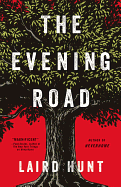
The Evening Road by Laird Hunt (Neverhome) meanders the backcountry roads of rural Indiana on a hot and troubled night, exploring human ugliness and the lives of two remarkable women.
Ottie Lee Henshaw is a red-haired beauty, eternally exasperated with her ill-kempt husband, Dale, and pursued by her randy boss, Bud. On this summer afternoon in 1920, Bud comes in excited by the prospect of driving to the neighboring town of Marvel to attend the "show": a promised lynching. Ottie Lee sets off with Bud, Dale and others; with a shifting cast of companions, she'll spend the rest of a long, sweltering night trying to get to Marvel.
Ottie Lee's adventures take up the first half of this novel before her counterpart, Calla Destry, appears. Calla is a light-skinned woman from the black part of town who faces her hard, violent world with stark defiance: she is inclined to head straight into Marvel to break the lynching's intended victims out of jail, while her family and community run the other way, lest they become victims themselves. It soon becomes clear that Calla's real aim is to find the man who has promised her a new beginning. But her wanderings parallel Ottie Lee's, and the two soon become more closely involved than either realizes.
The halves of this story are told in the first-person perspectives of these two women, and both are strong vernacular voices that bring flavor and color to their narratives. The Evening Road is a sad and raucous story, ugly and beautiful at once, evocatively starring two very different women. --Julia Jenkins, librarian and blogger at pagesofjulia

